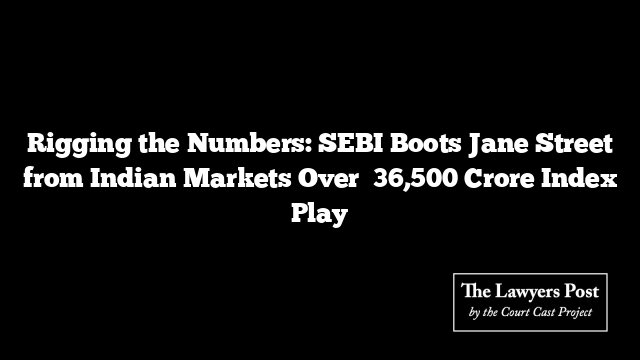In a scathing takedown of what it calls calculated manipulation masked as market participation, India’s markets regulator SEBI has kicked global trading heavyweight Jane Street Group and its affiliates out of the Indian securities landscape — at least for now.
On July 3, SEBI dropped an interim order slamming the doors shut on four Jane Street entities — JSI Investments Pvt Ltd, JSI2 Investments Pvt Ltd, Jane Street Singapore Pte Ltd, and Jane Street Asia Trading Ltd. The watchdog didn’t stop at a ban: it demanded the return of a staggering ₹4,843.57 crores, allegedly reaped through an elaborate game of index manipulation involving BANKNIFTY.
At the heart of the saga lies a pattern SEBI says was anything but accidental. The strategy was blunt and brazen: flood BANKNIFTY with aggressive buys to inflate its value, then pile on short positions in options — only to later dump those same stocks and cash in when the index dropped.
SEBI’s investigation, covering January 2023 to May 2025, spotlighted two such market-moving maneuvers. Take January 17, 2024, for example: Jane Street threw ₹4,370 crores at BANKNIFTY stocks and futures in the morning, while stealthily building a massive ₹32,115 crores short options position. Within the first 8 minutes, the group had already bought ₹572 crores worth — while quietly setting up a short exposure worth ₹8,751 crores.
By the afternoon, the script flipped. Jane Street offloaded ₹5,372 crores in stock, sending the index spiraling — and their options positions soaring in value. They walked away with ₹3,914 crores in options profits that day, despite losing nearly ₹200 crores on stocks. The goal, according to SEBI: bend the index to their will by hammering it during the final hour of trading.
The pattern repeated. On July 10, 2024, Jane Street unloaded ₹2,800 crores in the final hour while sitting on a mountain of bearish options worth ₹44,154 crores. The goal? Nudge the market into a close that made their options explode in value.
What made it worse, in SEBI’s eyes, was the defiance. After the NSE fired off a warning letter in February 2025, calling the firm’s actions “prima facie fraudulent,” Jane Street offered compliance reassurances. Then, according to SEBI, they went right back to business-as-usual just three months later.
The interim order accuses Jane Street of acting with deliberate intent to distort India’s markets — not just to win, but to win big. SEBI’s analysis shows they raked in ₹36,502 crores overall, almost entirely from options trading, while losing ₹7,687 crores in other trades. The regulator connected this to a troubling statistic: 93% of India’s retail derivatives traders lost money between FY22 and FY24. SEBI hinted that Jane Street’s outsized gains may have come, in part, at their expense.
Citing Supreme Court precedent that “nobody intentionally trades for loss,” SEBI found prima facie violations of:
- Section 12A of the SEBI Act, 1992
- Regulations 3 and 4 of the 2003 Prevention of Fraudulent and Unfair Trade Practices Rules
And with that came the hammer:
- A total ban on securities market access
- Freeze on all Indian assets
- Mandatory deposit of ₹4,844 crores in escrow
- Disclosure of all assets within 15 days
- Prohibition on disposal of assets without SEBI’s nod
Jane Street now finds itself boxed in — allowed only to square off existing derivatives positions within three months and settle past transactions.
A global firm that thrives on market precision may have just overstepped the line in India — and SEBI isn’t letting it slide.





